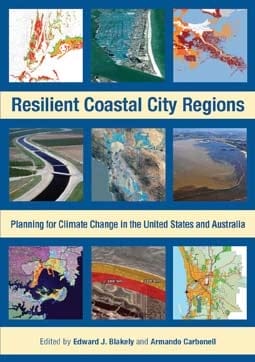Book

Resilient Coastal City Regions
Planning for Climate Change in the United States and Australia
Edited by Edward J. Blakely and Armando Carbonell
March 2012, English
Lincoln Institute of Land Policy
“Mounting evidence reveals ever-faster, more extreme outcomes in spheres climatic, economic, and so on; earth’s revenge may be sooner than we expect. We must do more than adapt and mitigate, we must reduce and prevent. These are now imperatives, and the only way to reach a future worthy of its name is to plan, especially in our most vulnerable ecotones, such as coastal cities. This book, by masters at their games, shows us how. It is now our turn to act, using their sage advice.”
— Michael Neuman, AICP, Professor of Sustainable Urbanism, University of New South Wales
This book reports on national, state, and local responses to climate-related risks of sea level rise and storm surge, drought and water shortage, floods, wildfires, and heat waves in nine coastal city regions: New York City, the Southeastern states, New Orleans, Los Angeles, and San Francisco in the United States; and Melbourne, Sydney, South East Queensland, and Perth in Australia.
About the Authors
Edward J. Blakely is honorary professor of urban policy at the United States Studies Centre at the University of Sydney, Australia.
Armando Carbonell is vice president of programs at the Lincoln Institute of Land Policy.
Reviews
“Resilience is the new sustainability, especially for coastal cities and regions facing a potent mix of climate change shocks and impacts. Blakely and Carbonell have assembled an impressive set of cases and authors, likely the single best source of information about climate change planning and adaptation in the United States and Australia. The book provides a rich array of ideas, best practices, and innovative solutions for tackling climate change, and is essential reading for planners, citizens, or public officials involved in charting the future of coastal cities and regions. This collection of cases will inform, motivate, and inspire other coastal urban regions in simultaneously adapting to and mitigating global climate change. The book provides a badly needed dose of hope – that coastal cities and regions around the world have the power to take tangible and effective steps to confront and plan for climate change, and can provide essential leadership in times of national and international complacency and inaction.”
— Timothy Beatley, Teresa Heinz Professor of Sustainable Communities, School of Architecture, University of Virginia
“The United States and Australia share many common social and political traditions, continental landscapes with diverse climatic conditions, and major coastal population and commercial hubs with vast interior hinterlands. In the past several years, both countries have been hit by acute natural catastrophes, reminding us of our shared environmental fragilities. These similarties serve as the template for this book on regional adaptation and sustainability planning to mitigate the potential damanges. This is a book for both policy makers and scholars, to help us deal more effectively and efficiently with the increasing confluences of natural disasters and climate change on dense metropolitan areas.”
— Robert Hill, Chairman, Low Carbon Australia; Chancellor, University of Adelaide; Former Australian Ambassador to the United Nations
Table of Contents
Introduction: Climate Change and Coastal City Regions, Armando Carbonell and Edward J. Blakely
United States
1. New York City, Robert D. Yaro and David M. Kooris
2. Southeastern Atlantic Coast States, Lauren Brown, Colin Quinn-Hurst, Phil Emmi, and Reid Ewing
3. New Orleans, Douglas J. Meffert and Joshua A. Lewis
4. Los Angeles–San Diego, Kenneth C. Topping
5. San Francisco, Laurie A. Johnson and Laura Tam
Australia
6. Melbourne, Peter M. J. Fisher
7. Sydney, Alan Cadogan
8. South East Queensland, Greg Laves and Peter Waterman
9. Perth, Laura Stocker, Peter Newman, and James Duggie
Conclusion: Transpacific Perspectives on Climate Action, Edward J. Blakely and Armando Carbonell
Keywords
Adaptation, Climate Mitigation, Conservation, Disaster Recovery, Economic Development, Environment, Environmental Management, Environmental Planning, Floodplains, Land Market Regulation, Land Monitoring, Land Reform, Land Use, Land Use Planning, Mediation, Natural Resources, Open Space, Planning, Public Policy, Regulatory Regimes, Resilience, Smart Growth, Spatial Order, Sustainable Development, Urban, Urban Design, Urban Development, Urban Revitalization, Urban Upgrading and Regularization, Urbanism, Water
